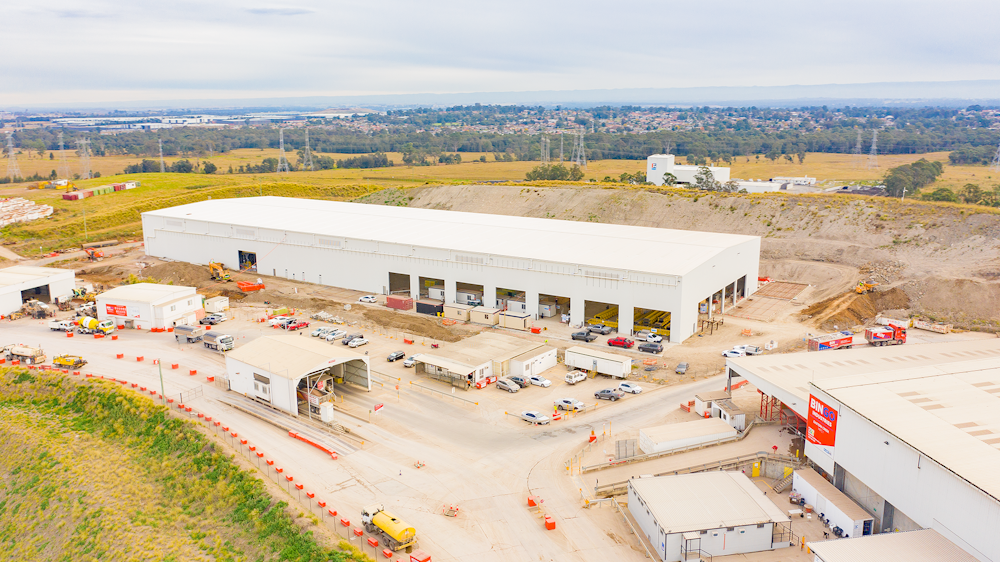The Recycling Ecology Park in Eastern Creek will be a fully integrated waste infrastructure site capable of accepting and processing all material streams. Spanning 82 hectares (the equivalent of approximately 85 football fields), the park features two Material Processing Centres (the second in development), a timber processing yard, a crushing and blending area for heavy materials such as roadbase and aggregates, and a landfill for waste that cannot be recovered such as asbestos. The park also has plans to install large-scale solar PV systems and operate from 100% renewable energy in the future.
The park’s second Materials Processing Centre (MPC 2), featuring some of the world’s leading recycling technology, is on track to be operational by early 2021. With an investment of $70M, the project is expected to have an industry leading recovery rate of up to 90%, meaning only a small amount of waste will end up in landfill.
MPC 2 will be able to process all forms of Construction and Demolition (C&D) and Commercial and Industrial (C&I) waste, recovering materials such as metal, timber, brick, rubble and concrete to be repurposed into new products. It will enable BINGO to fully utilise the two million tonnes per annum capacity the Recycling Ecology Park is licensed for, considerably increasing the diversion of C&D and C&I waste from landfill.
Its advanced sorting technology and highly automated recycling process is designed to maximise recovery and product quality. Through timber shredding, organic processing, brick and concrete crushing and scrap steel recycling, the facility will also broaden the company’s ECO Product range of building and landscaping products made from recycled materials. Eventually it hopes to further grow its product offering and expand into recycled rubber, glass, plastic and metal products.
The ECO Product range is a fast-growing revenue stream for BINGO. In FY20, $18.1 million in recycled product revenue was achieved compared to $13.4 million in the prior year. Products are used by building and infrastructure companies, landscaping businesses, councils and even the general public. A construction company may even end up using materials made from the waste it has generated at the same construction site.

As government policy continues to encourage the use of recycled building products in infrastructure and residential projects, this trend is expected to continue. According to Nik Comito, Head of Sustainability at BINGO Industries, it makes financial sense for businesses.
“When it comes to building and landscaping supplies, virgin materials can be up to 500% more expensive than recycled materials,” said Mr Comito. “When you throw away demolition waste, carbon emissions are released into our atmosphere as the waste breaks down. This means you lose all the embodied energy that was used to create the original building products. On top of this, you also miss out on a considerable cost saving.”
The waste management and recycling company has been collaborating with stakeholders such as engineers, start-ups and governments to help generate the end markets needed to make circular solutions the preferable and cheaper option. One example is working with the NSW Road and Maritime Services (RMS) to ensure its roadbase, bedding sand and fill meet RMS specifications for quality and safety.
“Having our products meet RMS requirements has been an important part of developing our ECO Product range,” said Mr Comito, “because in all construction projects, any materials used need to be checked and verified by engineers to ensure they are fit for purpose. This is an important step in using recycled products on a construction project and can sometimes be a reason why construction companies prefer to use virgin materials – which speaks to the importance of holding dialogue with multiple stakeholders and understanding their drivers for behaviour.”
Looking to the future, Mr Comito says he’s excited about where Australia is headed in terms of recycling and innovative circular solutions. “Yes, there is a lot of work to be done, but we are starting to see governments and industry shift to prioritise sustainable outcomes. 2020 and beyond will be transformative for BINGO as we continue to develop solutions to rubber, glass and plastic recycling and expand our recycled product offering.”
Learn more about BINGO's journey here.